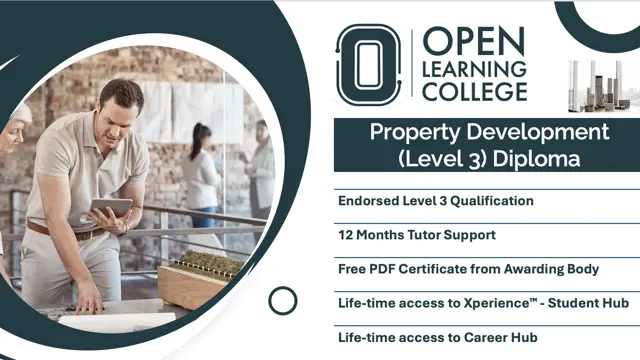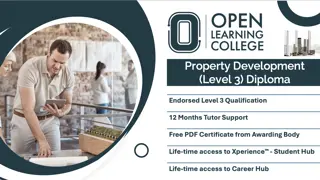
Property Development (Level 3)
Distance Learning Course, featuring tutor support and AI assistance, available online or as a study pack option.
Open Learning College
Summary
Funding options available on our website
- QLS & OPA - Free
- Exam(s) / assessment(s) is included in price
- Tutor is available to students
- TOTUM card included in price What's this?
Add to basket or enquire
Overview
Embark on a transformative learning journey with the UK’s most innovative home study provider, offering courses designed to unlock your true potential and facilitate the career change you desire. Access our distance learning courses directly from anywhere, anytime, and acquire industry-recognised Professional Qualifications essential for advancing in your career.
Specifically, explore the flexible and convenient Property Development (Level 3) course, an ideal way to gain a diploma qualification. Whether you aim for further education, improved job prospects, or expanded knowledge, this comprehensive course allows you to prepare thoroughly for exams or careers through home study. Plus, it’s structured to be accessible and beneficial even if you have no prior knowledge in Property Development.
This Property Development distance learning course has been designed to provide a clear and concise understanding of the nature of property development, what is involved, and how to undertake a successful project.
This course in intended for individuals who are new to property development, those who are interested and want to find out what is involved, and professionals in the trade who simply want to go over the basics.
This course allows you to study at your own pace, and is designed to develop an interest and understanding of property development, both on a business and personal level.
Achievement
Certificates
QLS & OPA
Digital certificate - Included
Open Learning College have undergone external quality checks to ensure that the organisation and the courses’ it offers meet a high standard. Regular reviews of our courses are carried out as part of the endorsement process.
The course depth and study has been benchmarked at Level 3 against level descriptors published by Ofqual.
Visit www.qualitylicencescheme.co.uk for more information.
1. You will receive your accreditation directly from QLS, once you have successfully completed your course (certification fees are included in the course fee).
2. You will receive the Open Pathway Accreditation Diploma (OPA.dip) from Open Learning College.
Course media
Resources
- Property Development Level 3 (QLS) Course -
Description
Course Key Topics
the Property Development (Level 3) course is divided into 21 modules.
Module 1: The property market, where to buy and who can develop
- What is property development?
- Who are property developers?
- Key job description
- Work Conditions
- Personal Requirements
- How can you benefit from property development?
- Who can develop properties?
- Landowners
- Where to buy property
- Professional involved in Property Development
Module 2: The author identifies how the credit crunch began, and how its aftermath has opened new doors to property investors
- The Credit Crunch explained
- How can you benefit from the housing market crash?
- Methods to overcome the Credit Crunch
- Become you own estate agent
- Sit it out
- Create several sources of revenue
- A work partner
- Methods of finding finance
- Control your outgoings
- Re-evaluate you property portfolio
- Stay focused and be strong
Module 3: Methods of property research
- Before you start
- National market v local market
- What types of properties can I buy?
- Where can I find out about what property is available?
- Where to really look
- Land Acquisition
- Finding property to invest
- Do your research
- Local neighbourhood analysis
- Flood area check
- Will your project be profitable
Module 4: property and the law, including conveyancing, knowing your rights, and how to sell your property
- Freehold or leasehold
- Conveyancing
- Restrictions and covenants
- Selling a property
- Types of surveys
- The legal process
- Gazumping and gazundering
- Knowing your rights
- Project particulars
- What to look out for
- Top tips for buyers and sellers
- Key terms
- What if there’s a problem?
- Useful addresses
- Checklist for buying property
- Property and Legal Glossary
Module 5: Different types of property
- Where to buy
- How to find a bargain
- Making an offer
- Types of property
- Listed buildings
- When is a building worthy of listing?
- Principles of selection
Module 6: Different methods of finance option available on the market
- Plan carefully
- Available equity
- Raising funds from family and friends
- Gearing
- Mortgages
- Insurance on mortgages
- Loans and overdrafts
- Investment syndicate
- Grants
- Government and Council schemes
- Shared ownership
- Who is eligible?
- How much does it cost?
- Taxes and fees
- Ongoing monthly costs
- Property cost checklist
Module 7: The nature of plans and drawings and how they might relate to your property
- Locations
- Lifestyle
- Size of family
- Environment
- Law and the government
- Reasons for building a home
- How to design house plans
- Sample plans
Module 8: what building regulations are and what they cover
- What are building regulations?
- Why comply with building regulations?
- What building work should comply with building regulations?
- What the regulations cover
- Buildings and building work exempt from building regulations
- How to apply for building regulations approval
- Local authority building control service
- A full plans application
- Building notice
- Approved inspectors’ building control service
- Consulting your neighbours
- How building regulations are enforced and how to appeal
- How are the building regulations enforced?
- What happens if you disagree with a local authority’s enforcement notice?
Module 9: The planning process
- Structure
- Do you need planning permission?
- Learn how to make an application
- The planning process
- Surveys
- Buy to let
- Yield
- Building a buy to let portfolio
- Do I need permission to rent my property?
- Where to advertise?
- Accommodation Agencies
- Tax implications of renting out property
- Who should pay the Council Tax?
- Do I have to take an inventory of the property?
- Insurance
- Written agreement
- Stamp duty
- Saleability
Module 10: The different project management options
- Who is going to manage your project?
- Managing a project yourself
- Appointing a Project Manager
- The Management Brief
- Questions you should ask yourself
Module 11: Renovation of property
- Clearing out for a renovation project
- General renovation tips
- Work schedule
- Information you need to gather
- Renovation a bathroom
- Renovating a basement
- Windows and lighting
- Building a home office
- Building a garage
- Construction costs
- Quotes to secure
- Building Regulations
- Gas and electrical
- Energy efficiency
- Decoration
Module 12: Buying at auction
- Do your research
- Auction regulations
- Reconnaissance trip
- Unsold lots
- Set a limit for yourself
- Be dispassionate
- Persistence
- Checklist
Module 13: The advantages and disadvantages of buying property before it is built
- What is Off-Plan property?
- Why buy property that hasn’t been built?Advantages of buying off-plan
- Disadvantages of buying off-plan
- Snagging
- Using a Property Investment Company
- Checklist
- What types of Off-Plan property are there?
- Subject to planning
- 2 month plus build programme
- Buying into an existing development
- Back-to-Back and Assignable Contracts
- Assignable contracts
Module 14: The different ways buying to let can be managed, and outlines a landlord’s rights and responsibilities
- The basic guide to buy-to-let
- Making money from buy-to-let
- Funding the right buy-to-let property
- Buy-to-let mortgages
- Licences
- Finding the right tenant(s)
- Tenancy deposit protection
- Your responsibilities as a landlord
- Landlord management fees
- Landlord Taxes
Module 15: Marketing your property efficiently
- Putting together a marketing strategy
- Tips on a sales strategy
- Advertising on the internet
- For Sale Boards
- Wording your property adverts
- Photographs
- Estate Agents
- Multi agency
Module 16 & 17: The different rules and regulations for buying property in Scotland and abroad
- Looking at properties
- Buying property in Scotland
- Pricing of property
- The buying process
- Valuation
- Making an offer
- Factors
- Buying Property in Ireland
- Buying Process
- Foreign market
- Buying without a lawyer
- Legal Advice
- Financing your property abroad
- Security
- Capital gain potential
- Tax
- Estate Agents abroad
- Bulgaria
- Barbados
- Safety and security
- Local travel
- Local laws and customs
- Natural disasters
Module 18 & 19: How to start a business and different types of businesses
- Where to start?
- Chances for success?
- What will it cost?
- Raising finance
- overnment and loan grants
- Know yourself
- How do you want to trade?
- Sole trader
- Partnership
- Limited company
- Advantages of a limited company
- Creating a business plan
- The business description
Module 20 & 21: The importance of recruiting and managing staff effectively
- Recruiting people you know
- The recruitment process
- The vacancy
- Attracting applicants
- Selection
- References
- The contract
- Roles of pay
- Benefits
- Training and development
Who is this course for?
- The target audience for Property Development is typically individuals who have a strong interest in the real estate industry and are looking to advance their knowledge and skills in property development.
- This course may appeal to those who are currently working in the field and want
- To enhance their credentials, as well as aspiring property developers who are
- looking to break into the industry.
- It may also attract professionals from related fields such as construction,
- architecture, or finance, who are seeking to expand their expertise and career
- opportunities.
- Overall, the target audience for Property Development (Level 3) is composed of motivated individuals who are eager to learn and excel in the dynamic and competitive world of property development.
Requirements
- The good news is that no prior learning knowledge or experience is essential to take this course. This course is openly available to anyone wishing to learn more about Property Development (Level 3) and would like to take part in a highly rewarding distance learning study course.
- We believe that everyone should have the opportunity to expand their knowledge and study further, so we try to keep our entry requirements to a minimum.
- You have the freedom to start the course at any time and continue your studies at your own pace for a period of up to 12 months from initial registration with full tutor support.
Career path
As a construction manager or site manager, you’ll be responsible for ensuring that a building project is completed safely, within an agreed timeframe and budget
Questions and answers
Reviews
Currently there are no reviews for this course. Be the first to leave a review.
Legal information
This course is advertised on reed.co.uk by the Course Provider, whose terms and conditions apply. Purchases are made directly from the Course Provider, and as such, content and materials are supplied by the Course Provider directly. Reed is acting as agent and not reseller in relation to this course. Reed's only responsibility is to facilitate your payment for the course. It is your responsibility to review and agree to the Course Provider's terms and conditions and satisfy yourself as to the suitability of the course you intend to purchase. Reed will not have any responsibility for the content of the course and/or associated materials.



